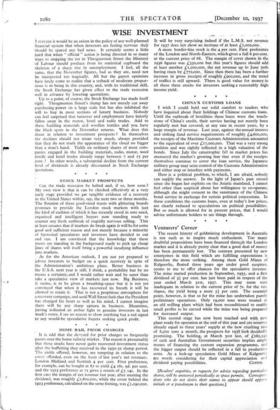WISE INVESTMENT
1 SUPFOSE it would be an axiom in the policy of any well-planned financial system that when investors are feeling nervous tlieSr should be spared any bad news. It certainly seems a little hard that when " official " action is being directed in so many viays to stopping the rot in Throgmoiton Street the Ministry of Labour should produce from its statistical cupboard the skeleton of a sharp rise in unemployment. I feel, all the same, that the November figures, bad as they are, need not be interpreted too tragically. All but the gayest optimists have lately come to realise that a setback of moderate propor- tions is in being in this country, and, with its traditional skill, the Stock Exchange has given effect to the trade recession well in advance by lowering quotations.
Up to a point, of course, the Stock Exchange has made itself right. Throgmorton Street's slump has not merely cut away purchasing power on a large scale but has also inhibited the will to buy in most sections of luxury business. Nobody can feel surprised that turnover and employment have latterly fallen away in the motor, hotel arid" radio trades. Add to these building materials and woollen textiles and you have the black spots in the November returns. What does this mean in relation to investment prospects ? In themselves the declines should not mean very much, always provided that they do not mark the appearance of the cloud no bigger than a man's hand. Yields on ordinary shares of most com- panies engaged in the building materials, radio, motor, wool textile and hotel trades already range between 7 and 15 per cent. ! In other words, a substantial decline from the current level of dividends is already discounted in Stock Exchange quotations.
*. * * *






















































 Previous page
Previous page